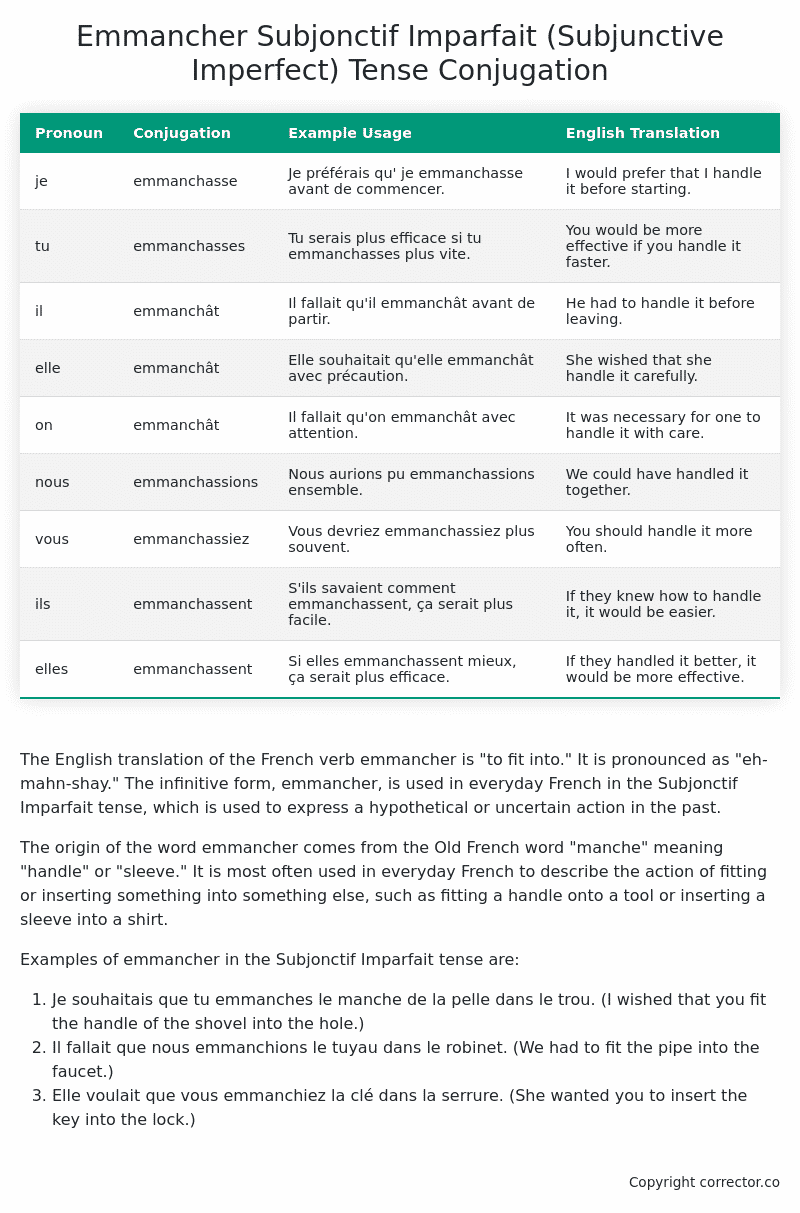Subjonctif Imparfait (Subjunctive Imperfect) Tense Conjugation of the French Verb emmancher
Introduction to the verb emmancher
The English translation of the French verb emmancher is “to fit into.” It is pronounced as “eh-mahn-shay.” The infinitive form, emmancher, is used in everyday French in the Subjonctif Imparfait tense, which is used to express a hypothetical or uncertain action in the past.
The origin of the word emmancher comes from the Old French word “manche” meaning “handle” or “sleeve.” It is most often used in everyday French to describe the action of fitting or inserting something into something else, such as fitting a handle onto a tool or inserting a sleeve into a shirt.
Examples of emmancher in the Subjonctif Imparfait tense are:
- Je souhaitais que tu emmanches le manche de la pelle dans le trou. (I wished that you fit the handle of the shovel into the hole.)
- Il fallait que nous emmanchions le tuyau dans le robinet. (We had to fit the pipe into the faucet.)
- Elle voulait que vous emmanchiez la clé dans la serrure. (She wanted you to insert the key into the lock.)
Table of the Subjonctif Imparfait (Subjunctive Imperfect) Tense Conjugation of emmancher
| Pronoun | Conjugation | Example Usage | English Translation |
|---|---|---|---|
| je | emmanchasse | Je préférais qu’ je emmanchasse avant de commencer. | I would prefer that I handle it before starting. |
| tu | emmanchasses | Tu serais plus efficace si tu emmanchasses plus vite. | You would be more effective if you handle it faster. |
| il | emmanchât | Il fallait qu’il emmanchât avant de partir. | He had to handle it before leaving. |
| elle | emmanchât | Elle souhaitait qu’elle emmanchât avec précaution. | She wished that she handle it carefully. |
| on | emmanchât | Il fallait qu’on emmanchât avec attention. | It was necessary for one to handle it with care. |
| nous | emmanchassions | Nous aurions pu emmanchassions ensemble. | We could have handled it together. |
| vous | emmanchassiez | Vous devriez emmanchassiez plus souvent. | You should handle it more often. |
| ils | emmanchassent | S’ils savaient comment emmanchassent, ça serait plus facile. | If they knew how to handle it, it would be easier. |
| elles | emmanchassent | Si elles emmanchassent mieux, ça serait plus efficace. | If they handled it better, it would be more effective. |
Other Conjugations for Emmancher.
Le Present (Present Tense) Conjugation of the French Verb emmancher
Imparfait (Imperfect) Tense Conjugation of the French Verb emmancher
Passé Simple (Simple Past) Tense Conjugation of the French Verb emmancher
Passé Composé (Present Perfect) Tense Conjugation of the French Verb emmancher
Futur Simple (Simple Future) Tense Conjugation of the French Verb emmancher
Futur Proche (Near Future) Tense Conjugation of the French Verb emmancher
Plus-que-parfait (Pluperfect) Tense Conjugation of the French Verb emmancher
Passé Antérieur (Past Anterior) Tense Conjugation of the French Verb emmancher
Futur Antérieur (Future Anterior) Tense Conjugation of the French Verb emmancher
Subjonctif Présent (Subjunctive Present) Tense Conjugation of the French Verb emmancher
Subjonctif Passé (Subjunctive Past) Tense Conjugation of the French Verb emmancher
Subjonctif Imparfait (Subjunctive Imperfect) Tense Conjugation of the French Verb emmancher (this article)
Subjonctif Plus-que-parfait (Subjunctive Pluperfect) Tense Conjugation of the French Verb emmancher
Conditionnel Présent (Conditional Present) Tense Conjugation of the French Verb emmancher
Conditionnel Passé (Conditional Past) Tense Conjugation of the French Verb emmancher
L’impératif Présent (Imperative Present) Tense Conjugation of the French Verb emmancher
L’infinitif Présent (Infinitive Present) Tense Conjugation of the French Verb emmancher
Struggling with French verbs or the language in general? Why not use our free French Grammar Checker – no registration required!
Get a FREE Download Study Sheet of this Conjugation 🔥
Simply right click the image below, click “save image” and get your free reference for the emmancher Subjonctif Imparfait tense conjugation!

Emmancher – About the French Subjonctif Imparfait (Subjunctive Imperfect) Tense
Formation
Common Everyday Usage Patterns
Interactions with Other Tenses
Subjonctif Présent
Indicatif Passé Composé
Conditional
Conditional Perfect
Summary
I hope you enjoyed this article on the verb emmancher. Still in a learning mood? Check out another TOTALLY random French verb conjugation!


